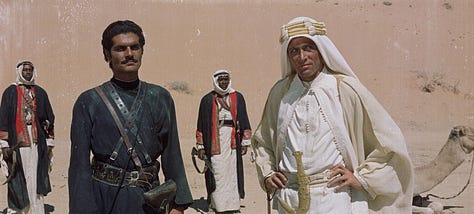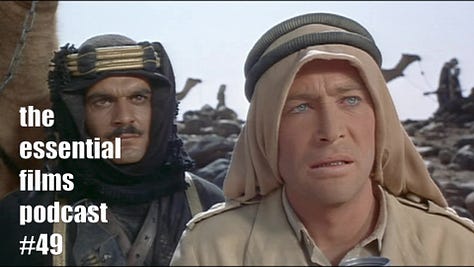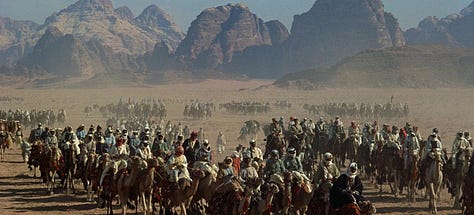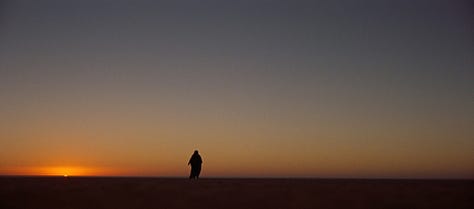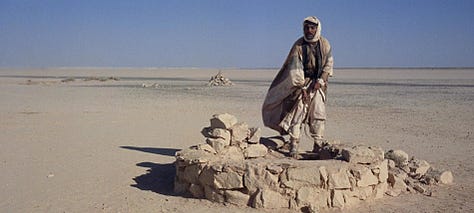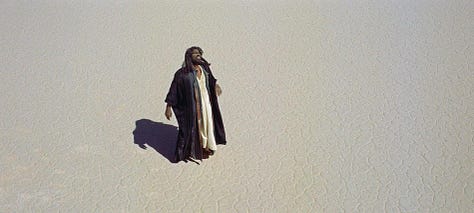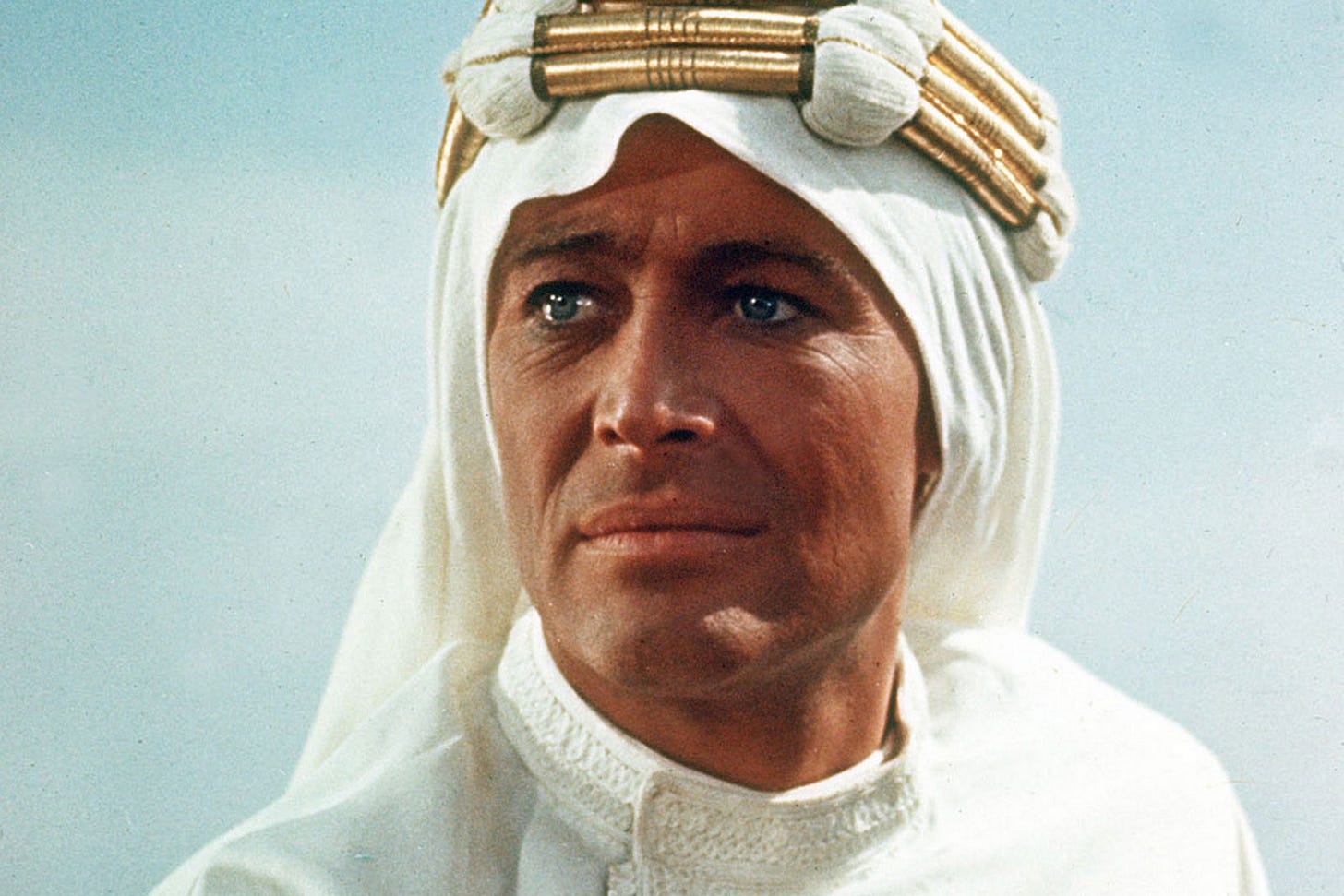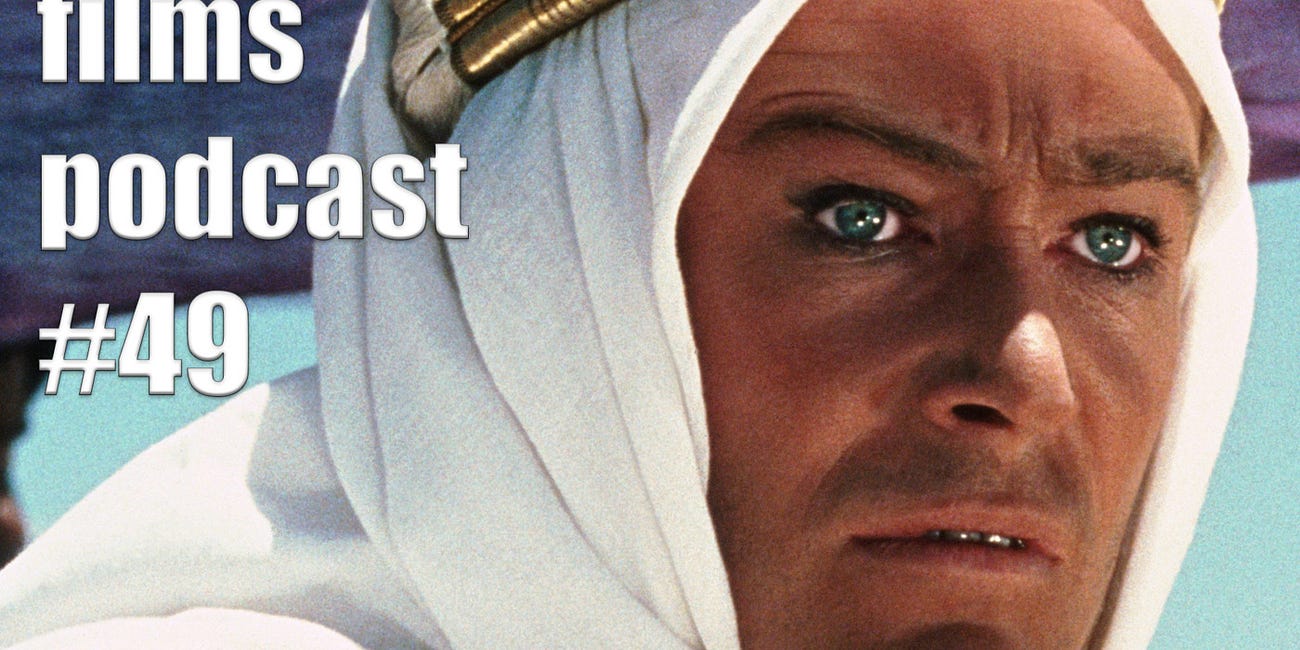LAWRENCE OF ARABIA
1962 • David LeanCast: Peter O'Toole, Alec Guinness, Anthony Quinn, Jack Hawkins, José Ferrer, Anthony Quayle, Claude Rains, Arthur Kennedy, Omar Sharif
Screenplay: Robert Bolt, Michael Wilson; Based on Seven Pillars of Wisdom by T. E. Lawrence
Cinematography: Freddie A. Young
Music: Maurice Jarre
Columbia Pictures
- What is it, Major Lawrence, that attracts you personally to the desert?
- It's clean.
In all cinematic history, certain films stand out as definitive epics, towering monuments to the art of storytelling on the silver screen. Among these, Lawrence of Arabia may be the most epic of epics, with its sweeping vistas, captivating story, and masterful direction etching it into the annals of cinema's most revered works. The film follows the remarkable journey of T.E. Lawrence, a British army officer stationed in Cairo during World War I. Tasked with assessing the Arab revolt against the Ottoman Empire, Lawrence becomes deeply involved in the Arab cause, forging alliances with tribal leaders and leading daring raids against enemy strongholds. As his legend grows, Lawrence grapples with his own identity and the moral complexities of war, ultimately facing betrayal and disillusionment. Through triumph and tragedy, Lawrence's epic odyssey unfolds against the backdrop of a tumultuous region torn apart by conflict and ambition.
One of the moments that epitomizes Lean's mastery occurs early in the film, setting the tone for the epic journey that lies ahead. As Lawrence, portrayed by Peter O'Toole, holds a lit match to his lips, Lean seamlessly transitions to a shot of the vast desert landscape, with the sun emerging over the horizon. This simple yet profound sequence encapsulates Lean's ability to imbue every frame with a sense of awe and majesty, drawing the audience into Lawrence's world with breathtaking imagery.
David Lean's direction is visionary, where every frame tells a story. Each shot is meticulously composed, with Lean's keen eye for detail ensuring that every element contributes to the film's elegance. From the vast expanses of the desert to the intricate details of the costumes and set design, every aspect of the film is crafted with precision and care. The vivid hues of the sky, ranging from fiery oranges to deep blues, serve as a breathtaking backdrop to Lawrence's epic journey.
At the heart of the film's visual grandeur is the stunning cinematography of Freddie Young, who brings the desert landscape to life in breathtaking detail. Young's evocative imagery captures the harsh beauty of the Arabian desert, immersing the audience in Lawrence's epic odyssey with each sweeping panorama and intimate close-up. From the vast expanse of the desert to the intricacies of Lawrence's internal struggle, Young's cinematography serves as a visual symphony that elevates the film to unparalleled heights. If you get a chance to see the film on the big screen, it’s highly recommended, but if you can’t watch 4K version on the biggest television possible. It’s quite stunning.
Yet, for all its visual splendor, Lawrence of Arabia is ultimately a story of human triumph and tragedy, one that holds the audience rapt for its lengthy running time. Spanning over three hours, the film explores themes of identity, ambition, and the corrosive nature of power. From Lawrence's enigmatic persona to his tumultuous relationship with the Arab tribes, the film's narrative depth is matched only by its visual spectacle, captivating audiences from start to finish.
Central to the film's enduring legacy is Peter O'Toole's mesmerizing performance as T.E. Lawrence, a role that remains one of the most iconic in cinematic history. Incidentally, his first major starring role in film. From the moment he graces the screen, O'Toole commands attention with his magnetic presence and commanding portrayal of Lawrence. O'Toole's performance is a tour de force of cinematic acting. From Lawrence's audacious exploits on the battlefield to his internal struggles with identity and purpose, he embodies the essence of a man torn between two worlds: struggling to reconcile his British identity with his deep admiration for Arab culture and his own inner demons. O'Toole's Lawrence is charismatic yet tortured, heroic yet flawed. Through subtle gestures and piercing gazes, O'Toole conveys the inner turmoil of a man grappling with his own sense of purpose. In O'Toole's hands, Lawrence becomes more than just a historical figure; he becomes a symbol of the human spirit's capacity for greatness and tragedy. It is one of the finest ever captured on film. O’Toole famously didn’t win the Academy Award for his performance, but his competition was Gregory Peck in To Kill a Mockingbird, so… fair enough.
Lawrence of Arabia transcends time and space, transporting audiences to distant exotic lands and exploring the depths of the human experience. The film remains a shining example of epic filmmaking at its finest.
So long as the Arabs fight tribe against tribe, so long will they be a little people, a silly people - greedy, barbarous, and cruel, as you are.
Notable Awards & Accomplishments
Academy Award Winner: Best Picture
Academy Award Winner: Best Director
Academy Award Nominee: Best Actor (O’Toole)
Streaming: Criterion, Tubi
Digital Rental/Purchase: Available at major digital retailers
Physical Media: Available on 4K, Blu-Ray and DVD
Episode 49: Episode #49: LAWRENCE OF ARABIA (1962)
On today’s adventure, Adolfo & Mark will take "No Prisoners!" as they discuss the David Lean Academy Award-winning LAWRENCE OF ARABIA!

